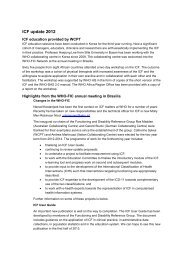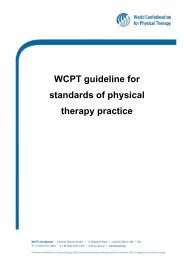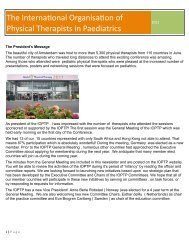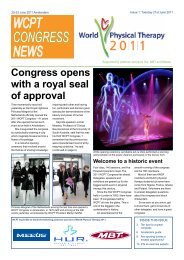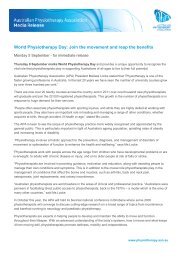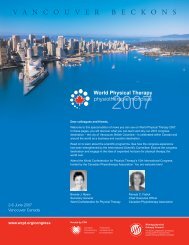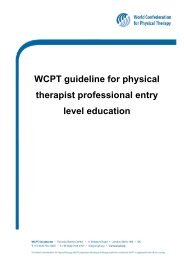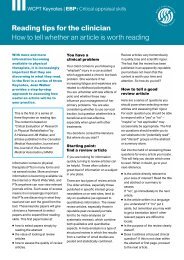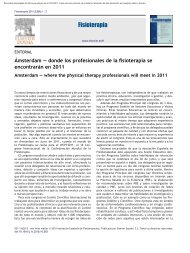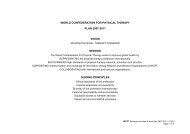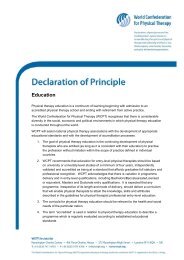wcpt congress: event of a lifetime - World Confederation for Physical ...
wcpt congress: event of a lifetime - World Confederation for Physical ...
wcpt congress: event of a lifetime - World Confederation for Physical ...
You also want an ePaper? Increase the reach of your titles
YUMPU automatically turns print PDFs into web optimized ePapers that Google loves.
BUSINESS<br />
Recruitment Is<br />
a two-way process<br />
We tend to think always<br />
that recruitment is all<br />
about the employer finding<br />
the right person <strong>for</strong><br />
the job. And while that is<br />
certainly the employer’s<br />
top priority, the applicants<br />
equally are deciding where<br />
and <strong>for</strong> whom they want<br />
to work.<br />
If you are applying <strong>for</strong><br />
a position, you must do<br />
your homework. This will<br />
include checking out the<br />
prospective employer<br />
through their website or<br />
word <strong>of</strong> mouth, how they<br />
advertise, etc. If you really<br />
want to be in sports<br />
physiotherapy, make sure<br />
you’ve checked whether<br />
this is a significant part <strong>of</strong><br />
their work or not.<br />
Send <strong>of</strong>f a CV that you have read<br />
and checked thoroughly. Include a<br />
covering letter addressing the skills and<br />
competencies sought and impressing<br />
the employer that you are the right<br />
person <strong>for</strong> the role. CVs without a<br />
covering letter, or with errors or that<br />
appear generic and not personalised<br />
to the role sought, will not impress an<br />
employer that you genuinely want the<br />
job. It can be worthwhile delivering<br />
your application in person. That way<br />
you get a chance to see the practice<br />
and gain some first impressions.<br />
When your impressive application<br />
results in shortlisting and being invited<br />
to an interview, it’s time <strong>for</strong> more<br />
preparation. Know where the practice<br />
is and be sure you can get there on<br />
time. You may be asked to start by<br />
telling a little about yourself – don’t<br />
waffle and ramble. Decide what<br />
you’ll say and keep your introduction<br />
succinct. You may be asked behavourial<br />
questions, <strong>for</strong> example “Tell us about<br />
a time when you …”. In this scenario<br />
the employer is wanting examples <strong>of</strong><br />
how you have dealt with or reacted in<br />
given situations. Past behaviour is an<br />
indicator <strong>of</strong> future per<strong>for</strong>mance. You<br />
may be asked about your strengths and<br />
weaknesses. Don’t be afraid to disclose<br />
a weakness. We all have them, and to<br />
say you don’t is unrealistic. Having a<br />
weakness won’t eliminate you as an<br />
applicant. And think about one or two<br />
questions you want to ask. Do not use<br />
the opportunity to ask what you’ll be<br />
paid. Discussions about salary come<br />
later when you are <strong>of</strong>fered the job.<br />
Good recruitment practices on<br />
the part <strong>of</strong> both the prospective<br />
employer and the prospective<br />
employee will give greater<br />
surety <strong>of</strong> a lasting, fulfilling<br />
employment relationship.<br />
The interview process is your opportunity<br />
to assess fully if with this employer<br />
and practice is where you want to be,<br />
just as it is the employer’s chance to<br />
assess if you are right <strong>for</strong> them.<br />
When you are <strong>of</strong>fered the role, you<br />
must now be given an employment<br />
agreement to consider. You should<br />
either be told, or receive a covering<br />
letter advising, that you have the right<br />
to seek independent advice on the<br />
employment agreement. Take time to<br />
read the agreement carefully and to<br />
seek advice from someone you trust<br />
be<strong>for</strong>e you sign it.<br />
If you negotiate a change to the<br />
employment agreement, the employer<br />
must give you a fresh updated copy <strong>for</strong><br />
signing, and the employer will retain<br />
on your file all copies <strong>of</strong> employment<br />
agreements, even the draft ones. This<br />
is a legal requirement.<br />
The final agreement may include a trial<br />
period. This is permitted under law. A<br />
trial period <strong>of</strong> up to 90 days again gives<br />
both parties the opportunity to be certain<br />
you are the right person <strong>for</strong> the<br />
role and that you will be happy working<br />
in this practice and <strong>for</strong> this employer.<br />
Make sure the employer gives you the<br />
employment agreement ahead <strong>of</strong> time<br />
and that you sign your employment<br />
agreement be<strong>for</strong>e commencing work.<br />
Good recruitment practices on the<br />
part <strong>of</strong> both the prospective employer<br />
and the prospective employee will give<br />
greater surety <strong>of</strong> a lasting, fulfilling<br />
employment relationship.<br />
Joanne Lentfer<br />
Business Manager<br />
Physiotherapy Business : NZPPA<br />
22 | PHYSIO MATTERS AUGUST 2011



